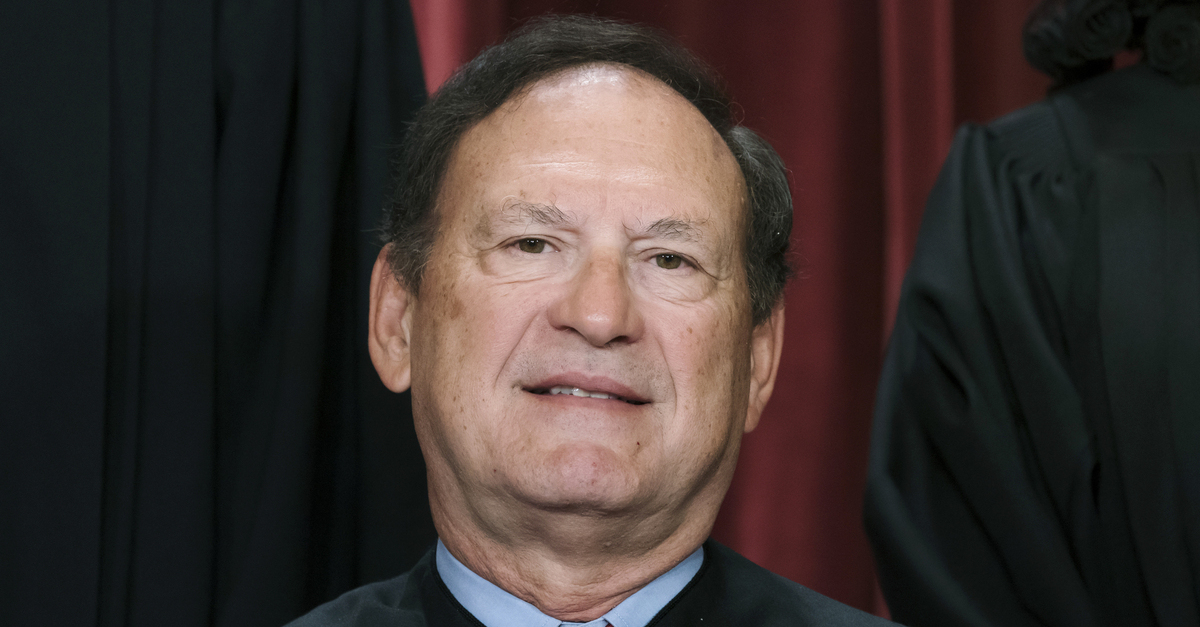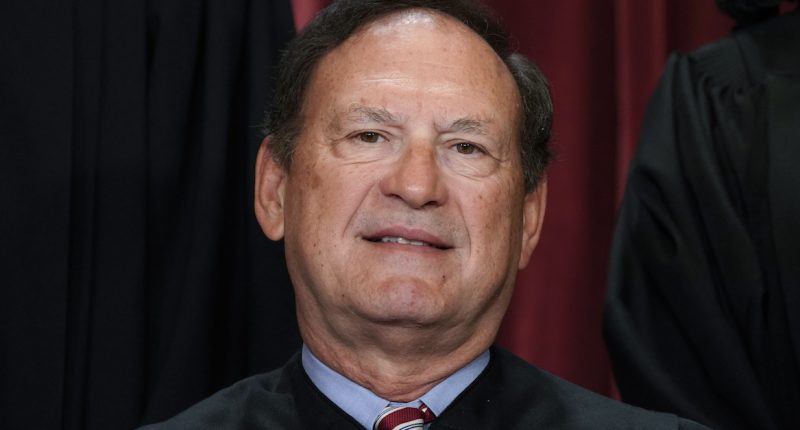
FILE – Associate Justice Samuel Alito joins other members of the Supreme Court as they pose for a new group portrait, Oct. 7, 2022, at the Supreme Court building in Washington. (AP Photo/J. Scott Applewhite, File)
The U.S. Supreme Court refused to hear the appeal of a California police officer denied qualified immunity in a civil rights case. Justice Samuel Alito was not pleased and said in a dissent Monday that the Court should have reviewed the case to correct a “serious misstep” in the lower court’s analysis.
The San Jose Police Department had an arrest warrant for armed robbery suspect Jacob Dominguez in 2017. Based on information from a confidential informant, the officers executing the warrant believed Dominguez was armed with a revolver. They located Dominguez in his car, and Officer Michael Pina ordered Dominguez to put his hands up. Dominguez complied, but then “quickly dropped his hands,” and “moved forward” with his hands “out of sight.” Pina apparently believed Dominguez was reaching for his firearm and when Dominguez quickly leaned back, Pina shot and killed him.
As Alito noted in his statement, “The whole encounter lasted less than one minute.”
Dominguez’s family then brought a federal civil rights lawsuit against Pina, and a jury found Pina liable for excessive force in violation of the Fourth Amendment.
On appeal, Pina argued that the district court had been wrong to deny him qualified immunity against the claim, but the U.S. Court of Appeals for the Ninth Circuit rejected his argument. The Ninth Circuit ruled that a reasonable jury could have found that Dominguez did not appear to be reaching for a gun when Pina shot him and therefore Pina was unjustified in using deadly force. Essentially, the appeals court ruled, Pina was not entitled to qualified immunity.
Qualified immunity is the often-criticized concept created by courts that renders government actors immune from lawsuits for official actions. It is frequently slammed for unfairly shielding law enforcement officers in cases involving excessive force or racial profiling in cases in which a plaintiff is unable to show that they were deprived of a right which was guaranteed in a statute or “clearly established” by case law. Among qualified immunity’s frequent critics are Justices Sonia Sotomayor and Clarence Thomas — two U.S. Supreme Court justices on opposite sides of the ideological spectrum.
Alito, a frequent critic of the Ninth Circuit, called the lower court’s qualified immunity ruling a “flagrant error” that “badly fumbled this basic tenet of our qualified immunity doctrine.”
Alito’s primary gripe was that the Ninth Circuit misused a 2022 case precedent that also involved the police shooting of a person suspected of drawing a gun.
In that case, Peck v. Montoya, the Ninth Circuit ruled that deputies who responded to a 911 call were not entitled to qualified immunity for fatally shooting a legally blind man during a confrontation at his home.
Paul Mono was 65 years old and legally blind. Mono and his wife, Susan Peck, had been embroiled in a dispute with Dennis Metzler, a general contractor who the couple had hired to renovate their home to make accommodations for Mono’s visual impairment. The Mono’s real estate agent, Jennifer Heflin, had been the person to recommend Metzler, and Heflin stepped in as an intermediary to help resolve the dispute. Mono, Peck, Metzler, and Heflin met at the Mono home when a confrontation erupted. Metzler called 911 saying that Mono had been waving a gun around, and five deputies responded. When Mono ignored the officers’ warnings, two of them shot and killed him.
Peck later testified that Mono never touched the gun, and posed no immediate threat to himself or others at the time officers shot Mono. Peck later sued the deputies, alleging violations of Mono’s Fourth Amendment rights and use of excessive force.
In its ruling in Dominguez, the Ninth Circuit applied the Peck precedent and found that Dominguez’s civil rights were “clearly established” just as Peck’s were — and that the denial of qualified immunity had been correct as to both sets of officers involved in the fatal shootings.
Alito argued in his dissent that the Peck precedent should never have applied to the Dominguez case due to the timing: the Peck opinion was handed down in 2022, while the Dominguez shooting happened in 2017. Therefore, Alito argued, the rights established in the Peck case could not have been “clearly established” at the time when Pina shot Dominguez.
Alito wrote (citations omitted):
The decisions below made more than a trifling mistake. In the Fourth Amendment context, the clearly-established law requirement provides essential notice at the “‘hazy border between excessive and acceptable force.’” But by holding an officer liable based on a judicial precedent issued after the events in question, the courts below ran roughshod over this key notice-bearing feature of our qualified-immunity jurisprudence.
Alito noted that he would have reversed the Ninth Circuit’s erroneous ruling to “reiterate a point that this Court has made time and again: a judicial decision can serve as a basis for clearly established law only if it predates the allegedly unlawful conduct.”
Justice Clarence Thomas, who has been an outspoken critic of qualified immunity, joined Alito’s statement.







